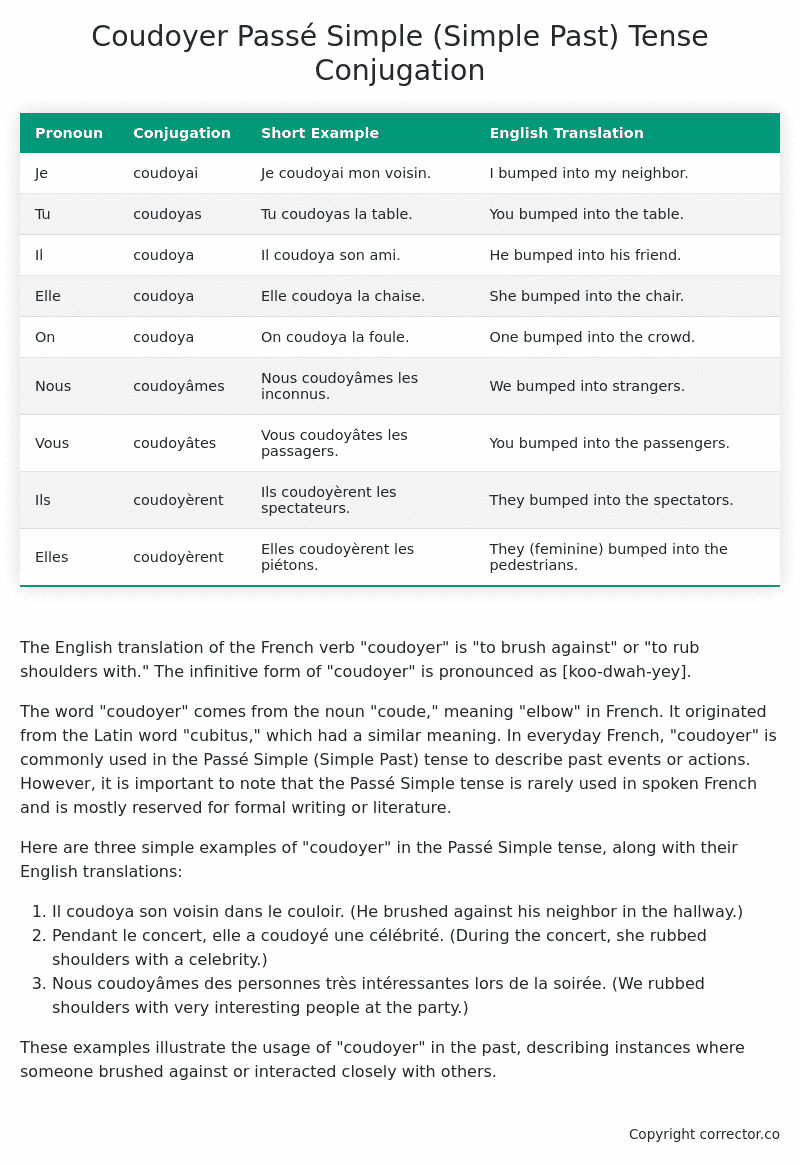Passé Simple (Simple Past) Tense Conjugation of the French Verb coudoyer
Introduction to the verb coudoyer
The English translation of the French verb “coudoyer” is “to brush against” or “to rub shoulders with.” The infinitive form of “coudoyer” is pronounced as [koo-dwah-yey].
The word “coudoyer” comes from the noun “coude,” meaning “elbow” in French. It originated from the Latin word “cubitus,” which had a similar meaning. In everyday French, “coudoyer” is commonly used in the Passé Simple (Simple Past) tense to describe past events or actions. However, it is important to note that the Passé Simple tense is rarely used in spoken French and is mostly reserved for formal writing or literature.
Here are three simple examples of “coudoyer” in the Passé Simple tense, along with their English translations:
- Il coudoya son voisin dans le couloir. (He brushed against his neighbor in the hallway.)
- Pendant le concert, elle a coudoyé une célébrité. (During the concert, she rubbed shoulders with a celebrity.)
- Nous coudoyâmes des personnes très intéressantes lors de la soirée. (We rubbed shoulders with very interesting people at the party.)
These examples illustrate the usage of “coudoyer” in the past, describing instances where someone brushed against or interacted closely with others.
Table of the Passé Simple (Simple Past) Tense Conjugation of coudoyer
| Pronoun | Conjugation | Short Example | English Translation |
|---|---|---|---|
| Je | coudoyai | Je coudoyai mon voisin. | I bumped into my neighbor. |
| Tu | coudoyas | Tu coudoyas la table. | You bumped into the table. |
| Il | coudoya | Il coudoya son ami. | He bumped into his friend. |
| Elle | coudoya | Elle coudoya la chaise. | She bumped into the chair. |
| On | coudoya | On coudoya la foule. | One bumped into the crowd. |
| Nous | coudoyâmes | Nous coudoyâmes les inconnus. | We bumped into strangers. |
| Vous | coudoyâtes | Vous coudoyâtes les passagers. | You bumped into the passengers. |
| Ils | coudoyèrent | Ils coudoyèrent les spectateurs. | They bumped into the spectators. |
| Elles | coudoyèrent | Elles coudoyèrent les piétons. | They (feminine) bumped into the pedestrians. |
Other Conjugations for Coudoyer.
Le Present (Present Tense) Conjugation of the French Verb coudoyer
Imparfait (Imperfect) Tense Conjugation of the French Verb coudoyer
Passé Simple (Simple Past) Tense Conjugation of the French Verb coudoyer (You’re reading it right now!)
Passé Composé (Present Perfect) Tense Conjugation of the French Verb coudoyer
Futur Simple (Simple Future) Tense Conjugation of the French Verb coudoyer
Futur Proche (Near Future) Tense Conjugation of the French Verb coudoyer
Plus-que-parfait (Pluperfect) Tense Conjugation of the French Verb coudoyer
Passé Antérieur (Past Anterior) Tense Conjugation of the French Verb coudoyer
Futur Antérieur (Future Anterior) Tense Conjugation of the French Verb coudoyer
Subjonctif Présent (Subjunctive Present) Tense Conjugation of the French Verb coudoyer
Subjonctif Passé (Subjunctive Past) Tense Conjugation of the French Verb coudoyer
Subjonctif Imparfait (Subjunctive Imperfect) Tense Conjugation of the French Verb coudoyer
Subjonctif Plus-que-parfait (Subjunctive Pluperfect) Tense Conjugation of the French Verb coudoyer
Conditionnel Présent (Conditional Present) Tense Conjugation of the French Verb coudoyer
Conditionnel Passé (Conditional Past) Tense Conjugation of the French Verb coudoyer
Conditionnel Passé II (Conditional Past II) Tense Conjugation of the French Verb coudoyer
L’impératif Présent (Imperative Present) Tense Conjugation of the French Verb coudoyer
L’impératif Passé (Imperative Past) Tense Conjugation of the French Verb coudoyer
L’infinitif Présent (Infinitive Present) Tense Conjugation of the French Verb coudoyer
L’infinitif Passé (Infinitive Past) Tense Conjugation of the French Verb coudoyer
Le Participe Présent (Present Participle) Tense Conjugation of the French Verb coudoyer
Le Participe Passé (Past Participle) Tense Conjugation of the French Verb coudoyer
Struggling with French verbs or the language in general? Why not use our free French Grammar Checker – no registration required!
Get a FREE Download Study Sheet of this Conjugation 🔥
Simply right click the image below, click “save image” and get your free reference for the coudoyer Passé Simple tense conjugation!

Coudoyer – About the French Passé Simple (Simple Past) Tense
Formation
Usage
Narration
Historical Context
Interactions with other tenses
Passé Composé
Imparfait
Conditional and Subjunctive
Summary
I hope you enjoyed this article on the verb coudoyer. Still in a learning mood? Check out another TOTALLY random French verb conjugation!


